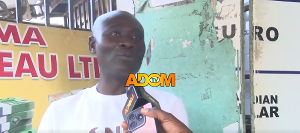Three Ghanaian photographers Nii Obodai, Nyani Quarmyne and Nana Kofi Acquah would represent Ghana at the 2011 edition of ‘Rencontres de Bamako’, an African photographic biennial, which opens on Monday, November 1 in the Malian capital, Bamako.
Obodai’s pictures, which are drawn from a book titled ‘Who Knows Tomorrow’ – a joint effort with Franco Algerian photographer Bruno Boudjelal, is one of the first books on contemporary art pictures in Ghana that examines the various facets of modern day Ghana.
Images of Quarmyne that would be on display vividly reveal the dramatic effects of climatic change on the coast of Ada, which obviously serve as an eloquent testament on the effects of erosion and the ever frequent tidal waves that pound the coastlines of Ada.
Acquah, on his part, will exhibit disturbing pictures from an open slaughter house at James Town, a suburb of Accra. The photos conduct an insightful foray into health and environmental implications, not only to the people of the community, but also the city at large.
Their selection follows a workshop for a number of photographers in Accra moderated by French photographer Denis Dailleux, and a further working visit by Laura Serani, an audio visual curator and co-artistic director of ‘Rencontres de Bamako’ 2011, who also examined the works of other photographers.
Dubbed ‘For a Sustainable World’, ‘Rencontres de Bamako’ 2011 will feature an examination of the search for a sustainable world with the intention of drafting a status report and paying particular attention to the signs and forms of possible resistance.
The widespread approval of the proposed theme has indeed confirmed the social and political commitment of African artists. Ecological concerns, which were previously limited to a restricted circle of alert intellectuals, are now part of our everyday life and at the heart of all debates.
With Samuel Sidibe as director, ‘Rencontres de Bamako’ 2011 will equally showcase how global warming, the exhaustion of mineral and food resources, deforestation and water shortages are currently at the centre of issues confronting large populations of the world.
With Tunisian visual arts curator Michket Krifa as co-artistic director, the biennial will also reveal how economic liberalism based on a consumer society has not only improved productivity and development, but also reinforced profit and inequality at the expense of basic respect for people and their environments.
The biennial has played a major role in the cultural life of Mali and the whole of Africa.
Over the past 17 years, it has developed into an indispensable Pan-African event for photographers on the African continent and the Diaspora, while offering artists exceptional opportunities to meet and share experiences with photography professionals from several parts of the world.
‘Rencontres de Bamako’ 2011 is being organized by the Malian Ministry of Culture in collaboration with Institut Français with support from the European Union, Priority Mutual Aid Fund, French Embassy in Mali, International La Francophonie, Casa Africa, Blachère, Agha Khan, Orange Mali, Hans Polack and Prince Claus Foundations.
Others are Fnac, Goodman Gallery, Castel Beer, Laboratoire Dupon, Laboratoire Picto, Circad, LaboratoireI-Labo, Institut Français of Cairo, Les Rencontres d’Arles, French Embassy in Ghana and Institut Français of South Africa.
Entertainment of Friday, 28 October 2011
Source: John Owoo
















